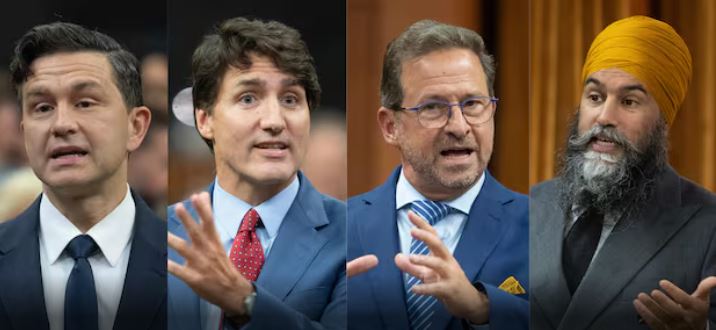Ottawa: Conservative Leader Pierre Poilievre escalated his campaign against the Liberal government on Tuesday by introducing a non-confidence motion in the House of Commons, calling on MPs to oust Prime Minister Justin Trudeau’s administration. This action is part of Poilievre’s broader vision to "restore the promise of Canada," centered around economic reform, tax cuts, and improving affordability for Canadian families, according to a report by CBC News. (Photo courtesy: CBC News.)
In his opening speech, Poilievre presented a vision where Canadians could "bring home the promise of Canada" by providing secure, high-paying jobs, affordable housing, fuel, and groceries, while ensuring that neighbourhoods remain safe. His proposal also includes scrapping the federal carbon tax in favour of large-scale green projects aimed at fighting climate change and using those revenues to pay down government debt.
Additionally, Poilievre promised to cap government spending, stating his government would follow a dollar-for-dollar law requiring savings for every new dollar spent.
However, his motion faces significant opposition from other parties. NDP Leader Jagmeet Singh dismissed the motion, asserting that his party would not support a Conservative government due to concerns over proposed budget cuts that could impact social services. Singh stated, "We are going to fight today against Conservative cuts and against the Conservative motion." The Bloc Québécois also confirmed it would not support the motion, reducing the likelihood of an early election.
Bloc House Leader Alain Therrien emphasized Quebec's distinct societal challenges, arguing Poilievre's policies lacked solutions tailored to the province's needs.
The debate on the non-confidence motion will conclude Wednesday, with a vote scheduled for the afternoon. Although polls have shown the Conservatives maintaining a lead over the Liberals, the lack of support from both the NDP and the Bloc Québécois suggests the motion is unlikely to pass, meaning the Liberal government will survive this challenge. If the motion were to succeed, it would lead to the collapse of the government and likely trigger an early election.

Prime Minister Justin Trudeau, who was in New York for the United Nations General Assembly, responded to the motion by accusing the Conservatives of focusing solely on power. In a statement during a media scrum, he said, "The Conservatives are very much thinking about power right now.
I’m thinking about how we can best help Canadians." Trudeau emphasized his government’s focus on keeping Canada's balance sheet strong while continuing to invest in its citizens, a contrast to what he described as Poilievre’s strategy of cuts.
In a related development, Poilievre's speech also included pointed criticism of BCE Inc. and its news division CTV, accusing them of altering a clip of his remarks during the debate. He labelled the company’s actions "dishonest" and "fraudulent," further accusing BCE CEO Mirko Bibic of prioritizing dividends and corporate profits over the public interest.
Poilievre's relationship with the media has been tense, often criticizing outlets like CTV, CBC, and other major networks for what he perceives as biased coverage in favour of the Liberals. His latest criticism stems from a CTV news segment where he claims his comments were edited to imply, he was linking his motion to the Liberal government’s dental care program.
CTV issued an apology, stating that the editing was a "misunderstanding" and clarifying that Poilievre’s comments were taken out of context. However, Poilievre's team rejected the apology, with Conservative spokesperson Sebastian Skamski posting on social media that the party would no longer engage with CTV News until a full acknowledgment of the error was made.
Despite the political theatrics surrounding the non-confidence vote, both the NDP and the Bloc Québécois have voiced their unwillingness to force an election, which would potentially give Poilievre’s Conservatives an opportunity to form a majority government.
The outcome of Wednesday's vote will signal whether Trudeau's minority government can navigate the ongoing parliamentary challenges, as both parties continue to battle over the future of key policies, such as the carbon tax and social services.
As the debate rages on, Canadians await the outcome of the vote, which could either signal stability for the Liberal government or set the stage for a high-stakes election campaign.